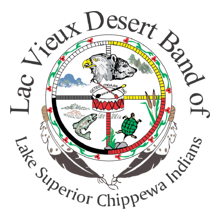What does our Tribal Historic Preservation Office do?
- The enforcement and administration of Lac Vieux Desert Tribal Code, Chapter 66, "Protection and Management of Archaeological, Historical and Cultural Resources" is a duty of the THPO and Tribal Court systems. Chapter 66 was developed in 2003 to establish policies and procedures for the protection of Cultural Resources of the Getegitigaaning Ojibwe Nation and for a mechanism to prosecute any individual who violates this code within the exterior boundaries of the reservation.
- Prior to any development of Tribal lands, an inventory of historical and culturally significant sites is conducted to minimize the desecration of burial sites.
- The Tribal Historic Preservation Office is responsible for the identification, documentation, and evaluation of Cultural, Historical and Sacred sites and materials, including the protection of modern religious/ceremonial practice sites.
- Training and education for site identification, Section 106 process, etc., will be afforded to Cultural committee members, Tribal members, Tribal staff and our youth by the THPO.
- The Tribal Historic Preservation Office will work in collaboration within the Getegitigaaning Ojibwe Nation Language program to do what ever is necessary for the maintenance of our Ojibwe Language.
- The THPO operates as the coordinator for the repatriation of human remains and associated funerary objects, classified under the Native American Graves Protection and Repatriation Act (NAGPRA), that are held in museums and ultimately belong to the Lac Vieux Desert Band.
- The Getegitigaaning Ojibwe Nation's THPO serves on Cultural Preservation and Repatriation Committees regionally, on behalf of the Tribe. These alliances work to repatriate ancestral remains that have been categorized as unidentified and/or unclaimed for reburial. Repatriation of these remains will be conducted in compliance with NAGPRA or the Native American Graves Protection and Repatriation Act.
- Other duties assumed from the State Historic Preservation Office (SHPO) include the following:
- To identify and nominate eligible properties to the Federal Register, and otherwise administer applications for listing historic properties on the National Register.
- To prepare and implement a comprehensive Tribal Historic Preservation Plan.
- Advise and assist, as appropriate, other Tribes, Federal and State agencies, and local governments in carrying out their historic preservation responsibilities.
- Cooperate with the Secretary of the Interior, the Advisory council on Historic Preservation, and State Historic Preservation Officer, other Federal and State agencies, local governments, and organizations and individuals, as appropriate, to ensure that historic properties are taken into consideration at all levels of planning and development.
- Provide general public information, education and training, and technical assistance in Historic Preservation to interested parties, and relevant Getegitigaaning Ojibwe Nation Historic Preservation information to Tribal members and other appropriate parties.
- Cooperate with local governments in the development of local Historic Preservation programs.
- Consult with appropriate Federal agencies in accordance with the National Historic Preservation Act regarding Federal undertakings that may affect historical properties and the content and sufficiency of any plans developed to protect, manage, or to reduce or mitigate harm to such projects.
- Advise and assist on the evaluation of proposals for rehabilitation projects that may qualify for Federal assistance.

